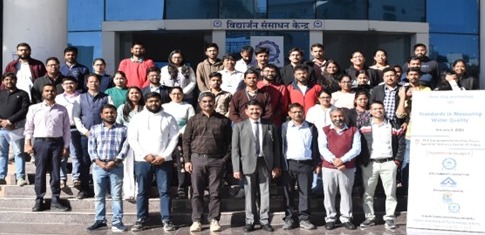Experts, researchers and others pose for a group photo after the workshop at IIT Indore | FP Photo
Indore (Madhya Pradesh): Experts, researchers, policymakers and students discussed the critical role of standards in assessing water quality and fostering sustainable water resource management at a one-day workshop titled “Standards in Measuring Water Quality” organized recently by the department of civil engineering, IIT Indore in collaboration with the Bureau of Indian Standards (BIS) and the Centre for Narmada Basin Management Studies.
The participants explored how standardising water quality assessment processes could improve measurement accuracy, emphasized the critical role of BIS standards in ensuring safe drinking water and highlighted the importance of adopting consistent methods for water analysis across regions.
The event also aimed at fostering collaboration among researchers and policymakers to address emerging water contamination challenges, enhancing public awareness about water safety standards and integrating advanced scientific techniques into water management practices for better decision-making and sustainable development.
Prof Manish Goyal, faculty at IIT Indore said, “The workshop emphasised on the growing concerns of water pollution in India, with particular focus on the north-eastern region and major river basins like the Narmada and Brahmaputra. The objective of the workshop was to create awareness about the Bureau of Indian Standards (BIS) guidelines for water quality and to encourage innovative research approaches for addressing water contamination issues. The workshop also stressed the need for greater public awareness of these standards and for actionable steps to combat water pollution.”
The sessions included a comprehensive overview of water pollution in the north-eastern region, focusing on the Brahmaputra river, absence of sewage treatment plants, presence of harmful contaminants like arsenic and iron and the over-reliance on groundwater.
There was also a detailed analysis of the water contamination trends in the region and regulatory measures in place to control industrial discharge with outlining potential solutions to improve compliance with environmental standards. An insightful lecture on sustainable water resource management, with particular focus on groundwater depletion and the urgent requirement for renewable sources was also delivered.
